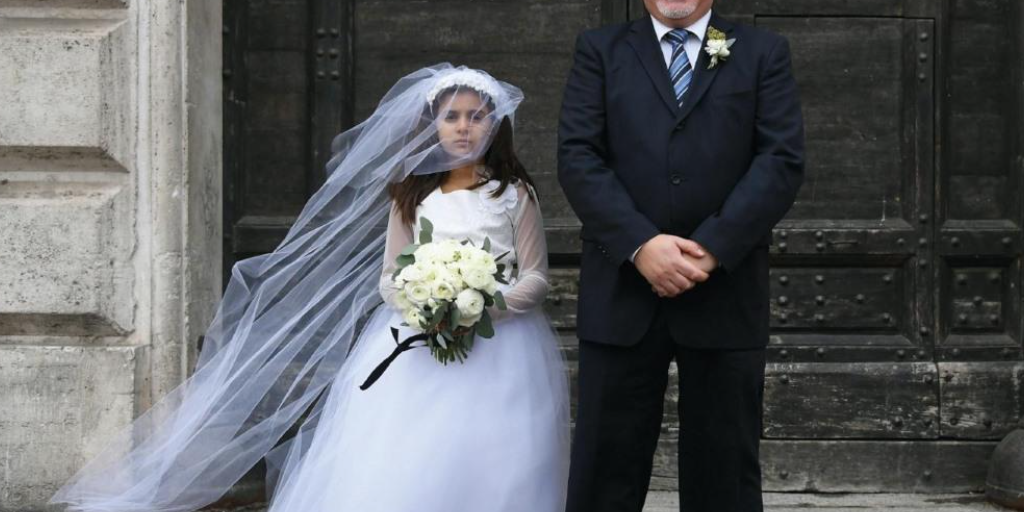When Dutch documentary filmmakers Joop Van Wijk and Hillie Molenaar visited Egypt’s rural regions in 1981, they were shocked to see the number of child marriage cases – adolescent girls forced into marriage, often by their fathers, and often lacking choice in the matter.
Their trip was the inspiration behind Daughters of the Nile (1982), a documentary on the restricted lives of rural Egyptian women, and their stories of forced marriage.
Despite being screened 40 years ago, the film remains relevant to Egypt’s existing struggle against child marriage – a burden that remains on the shoulders of the country to this day.
UNDERSTANDING CHILD MARRIAGE THROUGH DATA
Ironically, data trends in Egypt strongly suggest that there is an increase in the country’s average marriage age, from 20 years old to 22, as per the United Nations International Children Fund (UNICEF).
In rural regions, that number jumped from 18 to 20 in the span of nearly two decades. Yet these statistics don’t account for the total number of all child marriages in Egypt, an unrecorded burden conducted in secrecy that continues to plague the country.
The United Nations, which defines child marriage as “any marriage where at least one of the parties is under 18 years of age,” estimates that there are more than 650 million women alive today that were forced into child marriage around the world. The number becomes far more alarming when it translates to a child marriage every 28 minutes, in 2022.
In Egypt alone, nearly one in every twenty girls from ages 15 to 17 are married, according to a 2017 census by the Central Agency for Public Mobilization and Statistics (CAPMAS). In addition, one in ten adolescent girls between ages 15 to 19 are married or were married before the legal age, a stark contrast to Egypt’s increased average marriage age. Statistics for 2021 are, unfortunately, unavailable.
EGYPT’S CONTINUOUS BATTLE AGAINST CHILD MARRIAGE
While there are Egyptian laws limiting child marriage, the country addressed the problem later than neighboring countries in the Middle East and North Africa, only amending the legal marriage age to 18 in 2008 – failing to criminalize the act in the legal process.
However, Egypt’s Cabinet approved a draft law as recently as 12 April 2022, which intends to criminalize child marriages, with penalties of no less than one year in prison and a fine between EGP 50,000 (USD 2,600) and EGP 200,000 (USD 10,400).
While child marriages have become less prevalent today than in the previous decades due to the Child Act of 2008, Egypt’s long road to correct the cultural perception of the age for marriage continues. Particularly, in Upper Egypt, where the phenomenon is most common.
“Prevalence of early age of marriage was significantly high among governorates of Upper Egypt than in Lower Egypt (reaching 39.75 in rural areas in El Minya), especially in rural residency,” observes a report by researchers in Al-Azhar University.
The Child Act helped bring human rights violations into the scope of penal law, providing preventative measures for children forced into an early marriage. Since 2014 the government amplified its efforts beyond the articles of law to also include nationwide campaigns against child marriages.
As recently as this year, the National Council for Childhood and Motherhood prevented 27 child marriages in Upper Egypt during Eid Al-Fitr celebrations – 14 years after the country’s 2008 amendment of its Child Act.
Furthermore, Egypt’s Social Solidarity Ministry initiated the “Marriage Before 18 Equals No Rights” campaign in July 2022, which attempts to raise awareness of the consequences of child marriages.
On a more global level, Pathfinder International, a global health organization that tackles physical freedom and happiness, also invested in Egypt’s fight against early marriages, providing technical assistance and education to governmental and non-governmental organizations to enhance the country’s awareness campaign against child marriages.
AS EFFORTS INCREASE, SO DO THE CHALLENGES
Evidently, the efforts by each stakeholder aim to lessen the cases of early marriages and reshape the societal perception of the act itself. Yet the country’s facing a race against time, as the challenges continue to surmount each year.
With Egypt’s population predicted to spike up to 190 million in 2050, and with 33 percent of Egyptians under the age of 15, could child marriages proportionally increase if preventative action is not taken?
Victims of child marriage continue to fly under the radar through the archaic ‘urfi (customary) marriages, which are unregistered and illegally officiated by an Islamic cleric. To avoid legal punishment, child marriages are often later formalized once the child reaches the legal age.
As Egypt’s economy continues to suffer, and as income rates stagnate, fathers seek to relieve as many financial burdens as possible – marrying off daughters at an early age is treated as an answer to these burdens.
“Marrying off a young daughter in Egypt allows parents to reduce household expenses and to gain a source of income through the dowry paid to the bride’s family,” UNICEF explains in a 2017 report.
Most significantly, child marriages hinder society as a whole, creating a toxic cycle that occurs through successive generations.
For example, Egypt’s rapid overpopulation further suffers through child marriages, as child brides are statistically more likely to bear far more children than brides who were educated and married at a later age – perpetuating the country’s overpopulation situation even more.
At their core, child marriages are a symbol of female oppression – girls with no voice to protest and are expected to be obedient to any patriarchal presence.
Egypt’s road to eradicating early marriages, which began in recent decades, is the opportunity for girls to change their fate: from a destiny of forced marriage to a destiny of free choice.







Comment (1)
[…] instrumental in enforcing laws against child marriage and providing support to vulnerable children. Child marriage remains a persistent issue in some rural regions of Egypt, despite legal […]